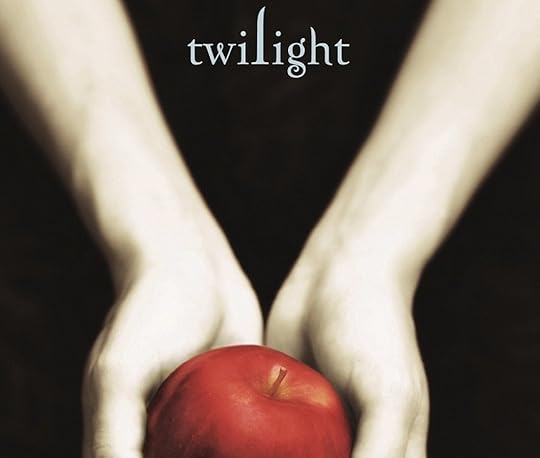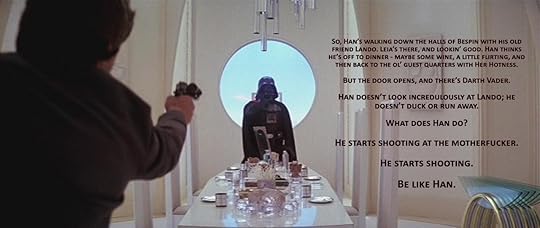In Defence of Sparkly Vampires
(This is the first in a series of posts I’m going to write this week on topics discussed in panels at 9 worlds and Loncon.)
I’m just going to come right out and say it:
Edward Cullen is one of the most effective vampires ever written.
I was on a couple of monster-related panels at Worldcon this past weekend. On one of them, the moderator opened by asking us what monster we’d like to be and why. I said a sparkly vampire, and the room laughed and booed. I won’t lie, I knew that would be the reaction, that’s why I said it, but that doesn’t mean I wasn’t serious: The Cullen clan are a phenomenally badass pieces of monster-writing, here’s why:
Monsters are usually metaphors for something, they’re human emotions clothed in skin or scale or feathers (or all three!) That’s how they work, because we feel those emotions when we read about them. Werewolves are about our fear of and attraction to rage and loss-self control, demons tantalise us with our fear of the arcane and vampires, vampires are all about sex.
So far, so obvious, right? Except that when you work with established creature types like these three, you almost inevitably find yourself writing in dialogue (‘in conversation’ as Cat Valente put it) with the way those creatures have been written before.
There’s nothing inherently wrong with that. It leads to some fantastically inventive twists on the mythos (one of my favourites is in China Miéville’s The Scar where he recasts it as a disease: ‘photophobic haemophagy’) but it makes reading your monster a more intellectual game, and also a more exclusive one. You need a knowledge of the genre and its tropes to come play. It becomes an invite-only party, an inside joke and even while you’re appreciating the cleverness of the punchline, it can get increasingly hard to retain the raw emotional power of the initial symbol.
But Twilight – and I know how weird this is going to sound to some of you – Twilight took the vampire back to basics. In a sense, Twilight is the Nirvana of Vampire fiction – stripped it back to its core elements, no room for pretension, an emotional shot in the arm to a generation of teenagers.
One of those core elements was sex. Sex, and the withholding of it, are some of the dominant themes in Twilight, and Meyer handles them in a way that, rather than consciously being ‘in conversation’ with a hundred years of vampire fiction, speaks directly to the lives and emotions of its readers. The desire, frustration, and uncertainty of getting into your first sexual relationships are acutely captured. Twilight wasn’t the first book to do this, but even so there’s no denying the impact that had on the emotions on millions of readers, and it’s no coincidence that these books exploded through the genre barriers when embracing their audience.
So there’s my case: emotional power, accessibility, and the idea that the hundred and fifty million people who love it might actually know what they’re talking about.
All that, that and they’re shiny too. And my scalp gives me natural empathy with shiny people.
(Aside: the scale of Twilight’s fans’ love for it is sometimes used to dismiss both the books and them. Speaking as a fan of a ton of stuff, and also as a writer whose primary goal in writing his books is to make people feel things, I find this straight-up nuts. We give far too little credit to the teenagers, former teenagers, and – specifically – teenage girls who love these books, and you don’t have to like everything in the books, or even like anything in the books to see that.
And yes, I know that the relationship between Bella and Edward sets off creepy stalker klaxons, and where teens carry the message that this is normal and romantic over into real life, that’s harmful. But think how often we rave about behaviour in stories that would be straight-up idiotic in the real world.
In Empire Strikes Back, when the doors open onto that Bespin dining room, and Han sees Vader and immediately starts shooting, we think ‘fuck yeah, man of action!’ not ‘Best case scenario Vader blocks the shots and they get captured, worst case he pisses him off enough the surrounding Storm Troopers execute him and all his friends. He at least could have tried to talk their way out. Thank fuck it’s Lawrence Kasdan writing this and not George RR Martin.’
I’m not saying Han Solo isn’t a badass, but I am saying we seem to be willing to give enough credit to the audiences of most stories – including ones we show to children – that they can distinguish fantasy from reality. We seem reluctant to accord this credit to Twilight fans. I don’t know why, but I suspect it has something to do with a lot of them being teenaged and female, and that’s bullshit. Aside ends)
UPDATE: Folks on twitter have expressed reservations about the star wars comparison: they say that the Twilight is more harmful as a part of a broad spectrum barrage of messages that tell women that abusive relationships are normal and they should stick with them. These people know this subject better than me and are likely right.





